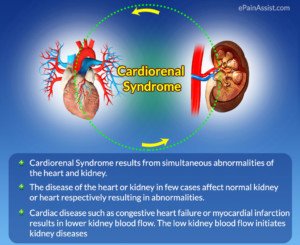
What determines when drug treatment in the elderly with acute heart failure and worsening renal function can be helpful vs. harmful?
Cardiorenal syndrome has no clear-cut cookie-cutter treatments.
Over the past 40 years, despite significant advances in various aspects of medicine, the treatment for cardiorenal syndrome remains baffling. During this time period, survival rates have not changed much, if at all.
There is no one-size-fits-all or template treatment plan for elderly patients who present with signs of acute heart failure accompanied by worsening kidney function.
Pharmaceuticals are the mainstay treatment. Problem is, it may be determined that these drugs would be more dangerous than helpful for some elderly patients with worsening renal function.

In fact, kidneys aside, some physicians may withhold drug therapy out of fear that a fatal arrhythmia could be triggered.
So is there ANY way to determine which of the elderly population with acute decompensated heart failure and worsening renal function receive drug treatment and which are passed over for it?
Keep in mind that if drug therapy is withheld due to fear of lethal heart rhythm or severe kidney injury, the patient will not recover spontaneously.
“There is often no easy answer in terms of deciding which medications to give to which patients,” says Mark Pool, MD, a board-certified cardiothoracic surgeon based in TX who’s been in private practice since 2011.
Dr. Pool continues, “That is why heart failure, and especially heart failure combined with renal failure, is such a difficult problem!
“No one has cracked this nut – it is a problem in every hospital across the country – though advancements in medical therapy seem to be offering some hope for improvements in this area.
“So the answer is, it often comes down to the skill and experience of the physician treating the patient.”
Nevertheless, if an elderly patient is admitted to the hospital with a diagnosis of acute heart failure, and his or her kidneys are getting worse – and eventually the patient dies – this should be taken as the vexing nature of cardiorenal syndrome rather than substandard medical care.

Dr. Pool performs some of the most complicated and high-risk heart surgeries in North Texas, including redo operations and multi-valve surgery, and has performed over 3,000 major operations.
 Lorra Garrick has been covering medical, fitness and cybersecurity topics for many years, having written thousands of articles for print magazines and websites, including as a ghostwriter. She’s also a former ACE-certified personal trainer.
Lorra Garrick has been covering medical, fitness and cybersecurity topics for many years, having written thousands of articles for print magazines and websites, including as a ghostwriter. She’s also a former ACE-certified personal trainer.
.





































